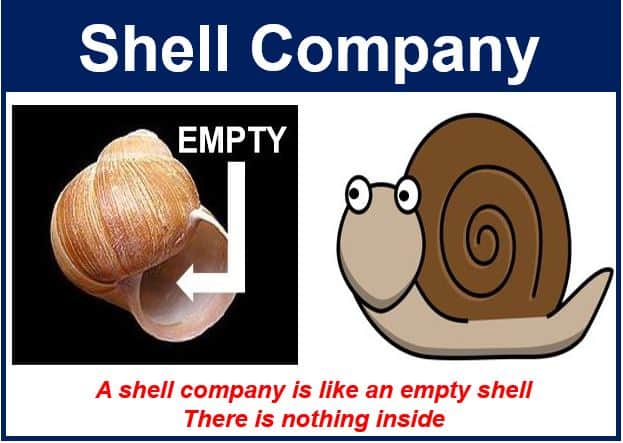What is a shell company? Definition and meaning
A shell company, also known as a shell corporation, is a firm with no current business activity or significant assets. Some shell companies may have had operations in the past, but these have dwindled due to either mismanagement or unfavorable market conditions.
Shell companies may also be referred to as mailbox companies, front companies, personal investment companies or international business companies.
A shell company may be set up or purchased in order to obtain financing before starting actual business. In such cases, the term has the same meaning as a shelf company.

Although shell companies are not illegal, and many have legitimate uses, they are also the most popular vehicle of choice for tax evaders, money launderers, funders of terrorism, and bribe givers and takers.
Money launderers send money across the world using and abusing shell companies, intermediaries and transmitters. Their aim is to create a web of confusion.
According to nasdaq.com, a shell company is:
“An incorporated company with no significant assets or operations, often formed to obtain financing before beginning actual business, or as a front **tax evasion.”
** Tax evasion is illegal, tax evaders use illegal methods to avoid paying taxes.
Example of a shell company for tax avoidance
Multinational businesses have been known to set up shell companies in countries with super-low corporate tax rates.
They do their international operations through their shell, thus not having to report to the country (where their operations are taking place) the sums involved, and considerably reduce their tax bill.
The British press and several politicians have criticized the convoluted ways certain American multinationals such as Starbucks operate in order to avoid paying taxes. Experts suggest that politicians, who are after all lawmakers, should focus their time on tightening up legislation rather than repeating the same rhetoric all the time.
In November 2014, European Union antitrust regulators ruled that a deal struck between Dutch authorities and Starbucks might be illegal, with the Netherlands giving the coffee-shop chain giant unfair tax breaks. According to the Commission, Starbucks was using a Netherlands subsidiary to shift revenue from higher-tax nations to lower-tax ones.
Tax havens more compliant than OECD nations
In an article published in the Economist in 2012, Michael Findley, Daniel Nielson and Jason Sharman showed how contrary to conventional wisdom, providers of shell companies in tax havens were much more likely to comply with international standards than OECD members (consisting mainly of the rich nations).
The authors posed as consultants and asked 3,700 incorporation agents in 182 nations to form companies for them. Forty-eight percent of agents did not ask for proper identification, while nearly half did not request any documents at all.
The authors wrote:
“Even poor countries had a better compliance rate, suggesting the problem in the rich world is not cost but unwillingness to follow the rules (see chart). Only ten out of 1,722 providers in America required notarized documents in line with the FATF standard.”
“This study, by far the most thorough of its kind, makes sobering reading for anyone who worries about the link between financial crime and corporate secrecy.”
Compliance refers to the ability or frequency of complying to rules and regulations.
Video – Untraceable shell companies and financial secrets
In this video, Professor Jason Sharman, from Griffith University in Brisbane, Australia, who has written extensively on tax havens, money laundering and grand corruption, talks about how effective transparency rules governing shell companies are.

